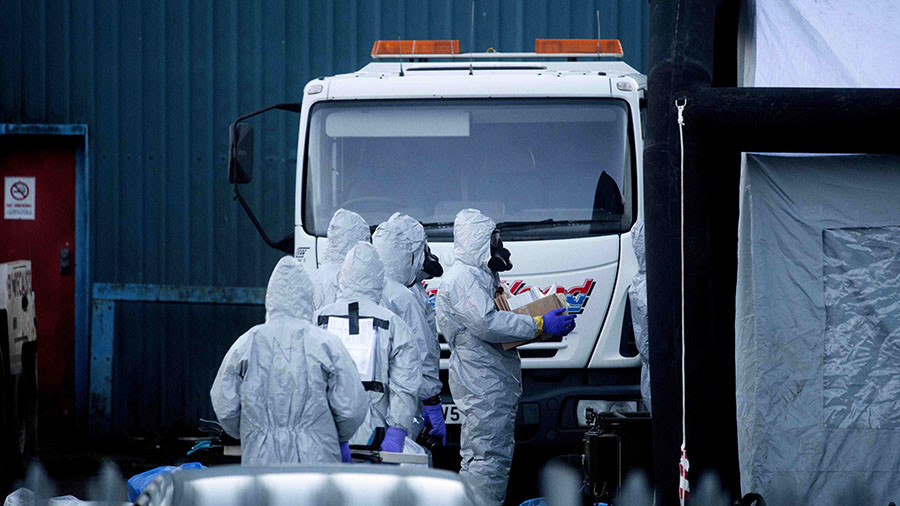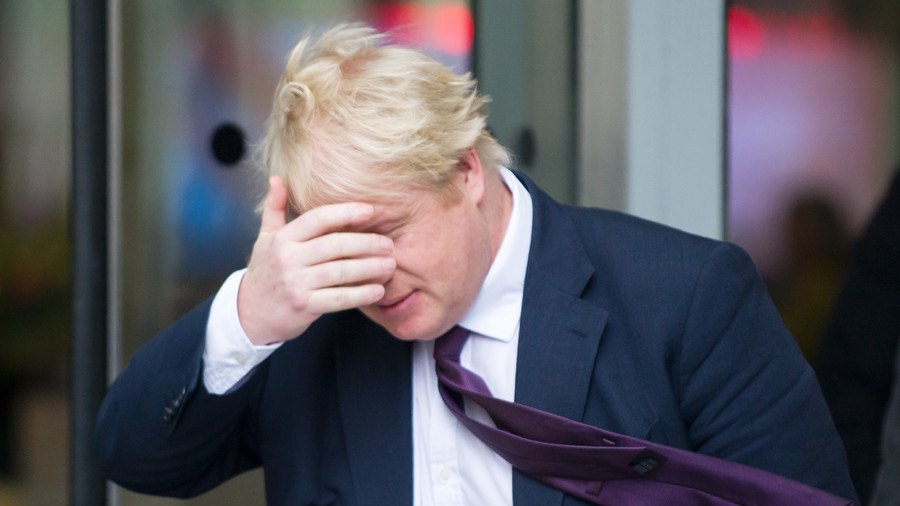Unidentified:
Porton Down scientists CANNOT confirm nerve agent used on Skripals
was made in Russia

RT,
3
April, 2018
UK
scientists have been unable to prove Russia made the nerve agent
A-234 (also known as "Novichok") which was used to poison
Sergei and Yulia Skripal in Salisbury.
Scientists
at the top secret army base Porton Down are unable to link the
samples to Russia, after weeks of Moscow insisting it had nothing to
do with the attack. Theresa May’s Government has repeatedly blamed
the Kremlin and imposed sanctions on Russia, including the expulsion
of 23 diplomats.
#Salisbury attack: Scientists have not been able to prove that Russia made the nerve agent used in the spy poisoning. Porton Down lab's chief exec reveals the details in this interview
Gary
Aitkenhead, chief executive of the Defence Science and Technology
Laboratory (DSTL) at Porton Down, told Sky News: "We were able
to identify it as novichok, to identify that it was military-grade
nerve agent.
"We
have not identified the precise source, but we have provided the
scientific info to government who have then used a number of other
sources to piece together the conclusions you have come to."
The
Skripals, ex-double agent Sergei and his 33-year-old daughter were
found slumped on a park bench in Wiltshire on March 4.
Downing
Street immediately pointed the finger at Russia and listed a raft of
heavy sanctions, the toughest in three decades. European nations were
persuaded by Britain to expel diplomats and were asked by allies in
the UK to back them against Moscow.
Now,
scientists say they are unsure of the links. Aitkenhead added: "It
is our job to provide the scientific evidence of what this particular
nerve agent is, we identified that it is from this particular family
[Novichok] and that it is a military grade, but it is not our job to
say where it was manufactured."
Aitkenhead
said there is no known antidote to Novichok, and that none was
administered to either of the Skripals. He suggested the substance
required "extremely sophisticated methods to create, something
only in the capabilities of a state actor".
The
OPCW (Organisation for the Prohibition of Chemical Weapons) said its
executive council would meet in the morning in The Hague, on Russia's
request.
READ
MORE: Russia has 13 questions to OPCW over Skripal case
Russia's
Ambassador in London, Alexander Yakovenko has repeatedly stated
Russia has been kept out of the loop.
Russia
has asked for samples so it can do tests and has insisted it be
allowed to investigate, after being blamed. However, the embassy is
left to get information through the press in the UK, according to
Yakovenko.


Exposed: Court documents cast doubt on Boris Johnson’s claim nerve gas is in ‘no doubt’ Novichok
Coverage from the Guardian
And the Independent
3
March, 2018
The
conclusion that Russia is to blame for Skripal's poisoning was based
not only on nerve agent laboratory data but partially on information,
received from the intelligence, the UK Foreign Office stated.
According
to the Foreign Office, the UK has information that Russia has
produced and stored a small amount of the poison gas.
A
British Government spokesperson said Porton Down's identification
of Novichok was "only one part of the intelligence
picture".
"This
includes our knowledge that within the last decade, Russia has
investigated ways of delivering nerve agents probably
for assassination — and as part of this
programme has produced and stockpiled small quantities of Novichok;
Russia's record of conducting state-sponsored assassinations;
and our assessment that Russia views former intelligence officers
as targets. As the Prime Minister has set out in a number
of statements to the Commons since 12 March, this
includes our knowledge that within the last decade, Russia has
investigated ways of delivering nerve agents probably
for assassination — and as part of this
programme has produced and stockpiled small quantities of Novichoks,"
he noted.
London
also took into consideration "Russia's record of conducting
state-sponsored assassinations; and our assessment that Russia views
former intelligence officers as targets."
"It
is our assessment that Russia was responsible for this brazen
and reckless act and, as the international community agrees,
there is no other plausible explanation," the Foreign Office
statement read.
Earlier
in the day, Sky News reported that Porton Down experts are
unable to identify the precise source of the nerve agent
that was used in poisoning the former Russian agent, but that
it was a military-grade nerve agent.
"We
were able to identify it as Novichok, to identify that
it was a military-grade nerve agent. We have not identified the
precise source, but we have provided the scientific info to the
government who have then used a number of other sources to piece
together the conclusions you have come to," Gary Aitkenhead,
chief executive of the Defence Science and Technology Laboratory
(DSTL) at Porton Down stated.
Relations
between the UK and Russia have seriously deteriorated
over the Salisbury
nerve agent attack in which
former Russian intelligence officer Sergei Skripal and his daughter
were seriously injured.
The
UK side has declared that this substance is similar to the
Novichok-class nerve agents developed in the Soviet Union.
UK
Prime Minister Theresa May has blamed Russia for organizing the
attack and expelled
23 Russian diplomats as a
punitive measure. A number of countries have supported the UK
claims and
expelled more than 150 Russian diplomats.
The
Russian side has denied all the accusations and suggested
participating jointly in the investigation. However, Moscow's
request for samples was ignored. Moscow in turn also
expelled Western countries diplomats and ordered the British Council
to stop its activities in Russia in response
to London's move.




No comments:
Post a Comment
Note: only a member of this blog may post a comment.